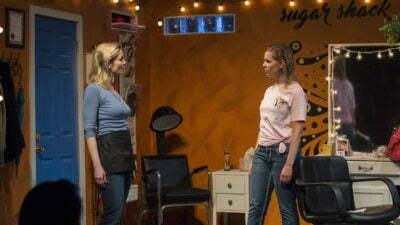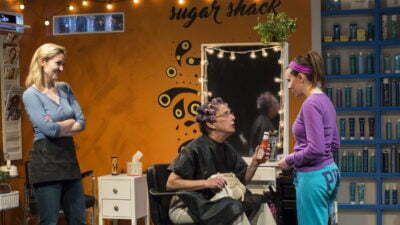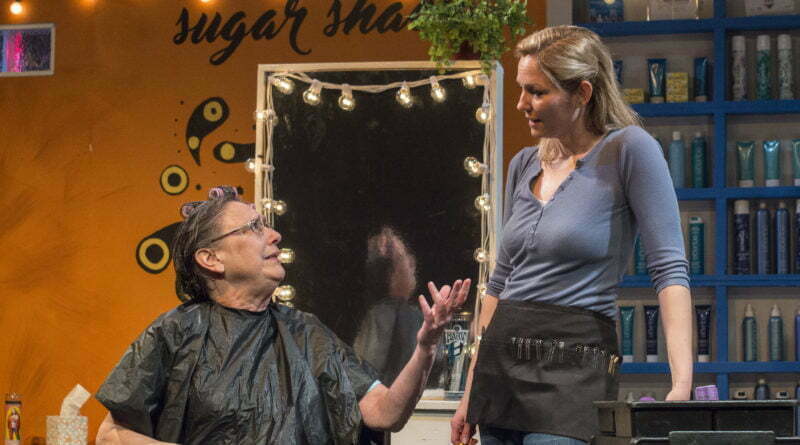American Beauty Shop
By Dana Lynn Formby
Directed by Megan Shuchman
Produced by Chicago Dramatists
Character Make Poor Decisions for Unclear Reasons
One of the most remarkable things about the economic recovery is how few people noticed it. Small towns are still moribund, vast swaths of people are underemployed, and the Trump and Sanders campaigns tapped into enormous discontent across the political spectrum. The newest play from Chicago Dramatists resident playwright Dana Lynn Formby is the story of working women struggling to get by in a small Colorado town following the 2008 financial meltdown. American Beauty Shop is a story of our times, but doesn’t contribute very much to our understanding of financial stress, and the reasons for the central conflict in the play are downright bizarre.

The Sugar Shack is a beauty salon formerly located on Main Street, but now operates out of a basement. Our introduction to Sue (Katherine Keberlein), the proprietress, is her imploring her sole employee, Meg (Melissa DePrey) not to kill a fly. Sue’s not delicate, though. A single mother whose plan in life got disrupted by her pregnancy, she got through beauty school on a government grant, and raised her daughter, Judy (Allison Totem), to be a piano player and specialist in biological chemistry. Judy has just been admitted to MIT with a full scholarship, and the Sugar Shack is overjoyed, mostly. Sue mutters that the reason she was awarded a scholarship was so that her child wouldn’t need one, but instead, her business is getting crushed by Supercuts, and nobody has money for beauty treatments anymore. But Judy has a golden ticket to freedom, and that’s progress, even if it isn’t perfect.

What Sue doesn’t know is that Judy is pregnant. The girl’s true confidant is her aunt, Doll (Allie Long), who became an alcoholic after the death of her baby daughter, and has been unstable ever since. The rational part of Judy’s mind understands that she should get an abortion, but she thinks doing so would implicitly reproach her mother, who choose to raise Judy at great expense to herself. Therefore, Judy and Doll resolve to keep the pregnancy and abortion a secret, and steal the money Sue was planning to use as capital while launching her own line of conditioner, with the intention of returning it later, somehow. I don’t understand the reasoning for this. Sue tells Judy from the beginning to leave their town behind, and never be held back by anyone in it ever again. There’s no reason to think any kind of subterfuge is required, and indeed, doing things in this manner creates huge problems for no reason. And Judy and Doll take Sue’s money without knowing she needed it for something important, but since Sue’s been telling them about her plan to reach a deal with a distributer for her conditioner all along, and needed Judy’s help to make her product in the first place, it doesn’t make any sense for them not to know that.

Formby tries to make these bizarre decisions arise from the characters’ complicated psychology, and she does provide some interesting portraits. I particularly enjoyed Barbara Roeder Harris’s performance as Helen, an elderly anti-war activist who forever associates the government with the military that stole her son, and will gladly take her chances on the lottery forever instead of accepting any assistance from Uncle Sam. But most of the actresses’ delivery of working class speech is weirdly strained, especially when they use terms of endearment for each other, and Sue is the only character who was completely believable. Part of the reason for Judy’s distrust for her mother is that she wanted to accept a scholarship to study music at a state school, instead of chemistry at MIT, and resents being pressured to put money ahead of her actual joys. But her second-guessing whether to or get an abortion or leave town at all closes both paths to her, and for a supposedly smart girl, she has an extremely difficult time understanding that her mother’s life is horrible, even if she does have the joys of motherhood. That a main character in a play named American Beauty Shop would have such an inexplicably Old World notion of economic improvement as a betrayal of one’s roots instead of a fulfillment of one’s ancestors’ struggles is frustrating.
Somewhat Recommended
Jacob Davis
Reviewed May 7, 2016
For more information, see American Beauty Shop’s page on Theatre in Chicago.
Playing at Chicago Dramatists, 1105 W Chicago Ave, Chicago. Tickets are $18-33; to order, call 312-633-0630 or visit chicagodramatists.org. Performances are Thursdays-Saturdays at 7:30 pm and Sunday at 3:00 pm through June 5. Running time is two hours, with one intermission.

